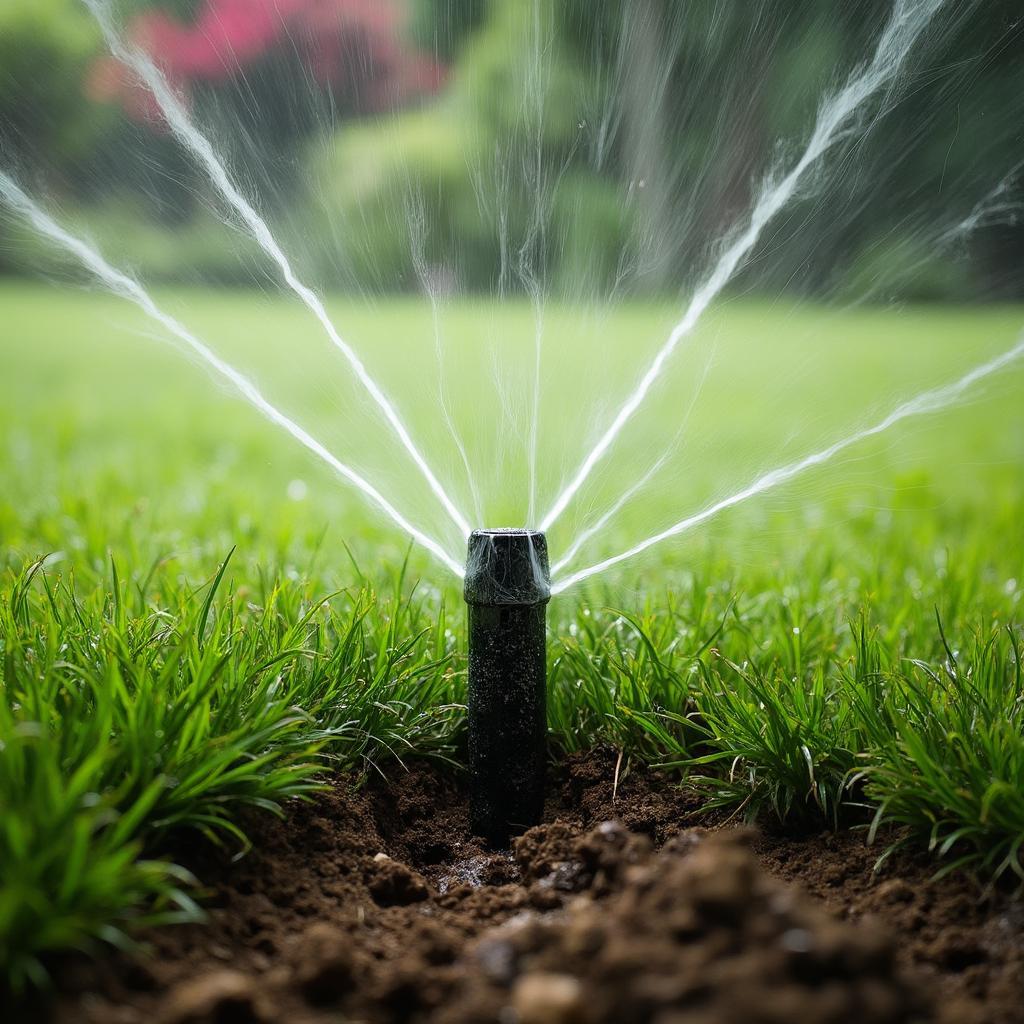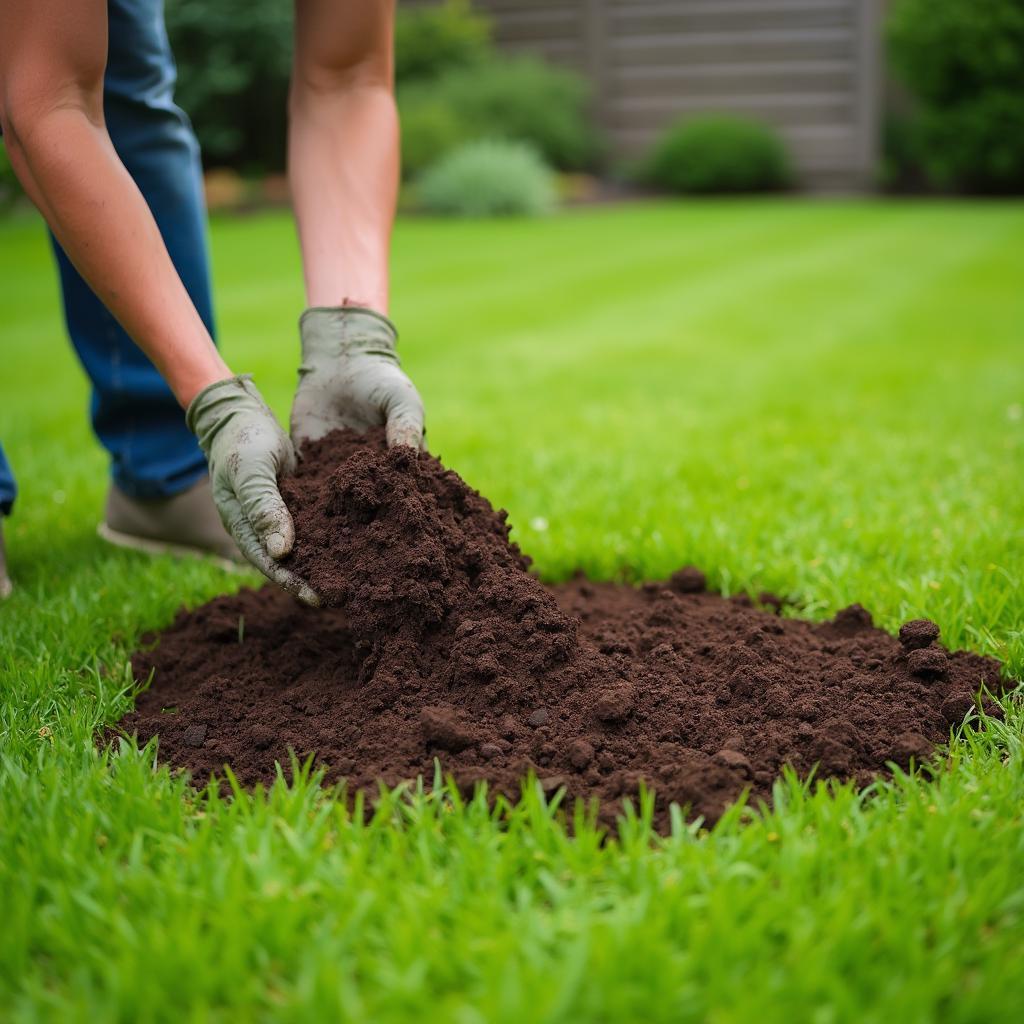Your cart is currently empty!

Top Lawn Care Tips
A lush, green lawn is the envy of every neighborhood. Achieving this picturesque landscape, however, requires more than just occasional watering. This guide provides Top Lawn Care Tips to help you cultivate a healthy and vibrant lawn you can be proud of.
Essential Lawn Care Practices
Maintaining a healthy lawn involves a few key practices. Regular mowing is crucial, ensuring you cut no more than one-third of the grass blade at a time. This promotes denser growth and prevents scalping, which weakens the grass and makes it susceptible to diseases. Proper watering is equally important. Deep, infrequent watering encourages deep root growth, making your lawn more drought-tolerant. Finally, feeding your lawn with the right nutrients is essential for its overall health and vibrancy.
 Deep Watering for a Healthy Lawn
Deep Watering for a Healthy Lawn
Choosing the Right Fertilizer
Selecting the right fertilizer is crucial for a thriving lawn. Understanding the N-P-K ratio, which represents the percentage of nitrogen, phosphorus, and potassium, is key. Nitrogen promotes leaf growth, phosphorus supports root development, and potassium enhances overall plant health and disease resistance. top 10 lawn care tips provides more insight into choosing the best fertilizer for your specific lawn needs. A soil test can help determine nutrient deficiencies and guide your fertilizer choices.
Dealing with Common Lawn Problems
Even with the best care, lawns can encounter problems. Brown patches, weeds, and pests are common challenges. Identifying the cause is the first step to effective treatment. Brown patches could be due to fungal diseases, grubs, or even dog urine. Weeds compete with your grass for resources, while pests can cause significant damage. Addressing these issues promptly is essential to prevent further damage and maintain a healthy lawn.
Top Lawn Care Tips for Different Seasons
Lawn care needs vary throughout the year. In spring, focus on removing debris, aerating, and overseeding. Summer requires frequent mowing and watering. Fall is the ideal time for fertilization and preparing your lawn for winter. During winter, minimize foot traffic and avoid heavy equipment on frozen grass. june lawn care tips offers specific guidance for maintaining a healthy lawn during the summer months.
The Importance of Aeration and Overseeding
Aeration and overseeding are vital for a healthy lawn. Aeration creates small holes in the soil, allowing air, water, and nutrients to reach the roots more effectively. This promotes deeper root growth and improves overall lawn health. Overseeding introduces new grass seed to fill in bare patches and thicken existing turf. top dressing lawn care tips provides a wealth of information on how these practices can significantly benefit your lawn.
Maintaining a Healthy Lawn with Organic Methods
For environmentally conscious homeowners, organic lawn care methods offer a sustainable alternative. These methods focus on building healthy soil, which in turn promotes healthy grass growth. Using compost, natural fertilizers, and beneficial insects can help create a thriving lawn without the use of harsh chemicals. top lawn care tips for beginners is a great resource for those starting their journey towards an organic lawn.
 Applying Organic Compost to Lawn
Applying Organic Compost to Lawn
“A healthy lawn starts with healthy soil,” says renowned horticulturalist, Dr. Emily Carter. “Focusing on organic practices not only benefits your lawn but also the environment.”
Conclusion
Achieving a beautiful and healthy lawn requires consistent effort and the right approach. By following these top lawn care tips, you can create a vibrant green space that enhances your home’s curb appeal and provides a relaxing outdoor environment. top tips for lawn care offers a quick overview of essential lawn care practices for those seeking a concise guide.
“Regular maintenance is key,” adds landscape architect, David Miller. “Don’t neglect your lawn, and it will reward you with its beauty.”
FAQ
- How often should I water my lawn?
- What is the best type of fertilizer for my lawn?
- How do I control weeds in my lawn?
- When is the best time to aerate my lawn?
- What are some common lawn diseases?
- How do I get rid of brown patches in my lawn?
- What are the benefits of overseeding?
For any assistance, please contact us via WhatsApp: +1(641)206-8880, Email: [email protected] or visit us at 456 Pine Avenue, Toronto, ON M5V 2J4, Canada. We have a 24/7 customer support team.

Leave a Reply